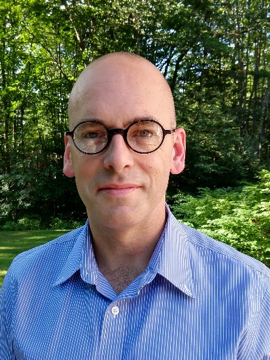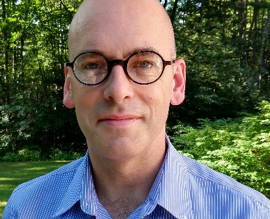Interview
What do you write?
As a poet, I write poems about my time in the U.S. Army, working at the United States Disciplinary Barracks as a correctional guard; I write poems about city and country life, and how they are simultaneously parallel yet their own ecosystem; I write poems about rural landscapes, whether they are in the far future or distant past.
Is there an author or artist who has most profoundly influenced your work?
This is difficult. I’ve lived for 43 years, and have been profoundly influenced by many things at different stages in my life. Early in my life, and still to this day, I was and am enamored with Japanese culture. I’ve read James Clavell’s Shogun many times since I first discovered it when I was a teenager. To me, the 1,152-page novel is pure historical entertainment. In my later years, closer to present day, I was assigned to read Kate Chopin’s The Awakening in an Intro to Literature class. It was, and is, a revelation. Of ideas. Of masterful sentences. Of turning points in my patterns of thought. And The Clan of the Cave Bear by Jean M. Auel, because of her sheer worldbuilding acumen.
Why did you choose Stonecoast?
In 2017, just after graduating from the University of Southern Maine, I attended the Stonecoast Writers’ Conference during the summer. I was really impressed with…well, everything. The workshop leaders, Theodora Goss and Laurie Albanese, were amazing. The logistical team of Justin, Matt, and Robin were warm and welcoming. I really didn’t even have to think about it, I wanted to go to Stonecoast for my MFA.
What is your favorite Stonecoast memory?
I received a compliment from a fellow poet in my class last semester. It was unexpected and real, and it resounds in my head each time I think, ‘What the hell am I doing trying to be a poet.’ Thank you, Becky.
What do you hope to accomplish in the future?
To live by the ocean with a large library and an endless supply of time.
If you could have written one book, story, or poem that already exists, which would you choose?
Quiver by Susan Somers-Willett. Within the fertile ground of science history and poetry lies this richly tender book of poetry. My favorite poem from this collection is “First Sex.” It is a cross pollination of sensual sounds and Gregor Mendel’s work.
Featured Work
The following are poems by Jonathan Pessant exclusively for Stonecoast Review.
Coyote
I hear the coyotes howling from my bedroom window
and I am excited, ecstatic at the prospect
of dying in the dark.
I want to touch their
fur and fangs,
and I want to caress them into submission.
Their song is unnatural from my window,
I turn out the lights to hear them better and for a moment
they are quiet, searching for me, or for my still-fear.
In between their cries, the pine crickets break
the silence. There are wild moments I can’t collapse,
I walk out into their mouths.
I can’t wait to walk in the city, walk downtown,
walk on pavement and brick, walk where people
have spit their kisses, walk upon the dreams of the young
and the dreams of the old and the dreams of the dreams.
I walk the city
and hear talk
from the windows
I don’t recognize.
I look up the side of the building
and hear music
I don’t recognize.
I hear the air conditioner drip, I hear the wind through the screens,
I hear the baby laughing, and I laugh, and she laughs, and I laugh.
I hear the ocean
of cars in the distance,
each wave honking, each wave revving, speeding up, slowing
I sense I’m about to step in shit, and sidestep
I sense the homeless man I smiled at stuck out his tongue as I passed.
There are wild moments I can’t collapse
into a single footstep, sometimes I feel I am the whisper
in the city, waiting
to belong, to reclaim, to give up
to step and step and step and step.
If I am not the coyote in this story.
cousins
my grandmother is a giant,
like an oak in the backyard,
providing.
We: Tonya, Billy, CJ, Bubba,
Susan, James, Vanessa, Marta,
Jonathan, Nick, Kate, Mae
We run to her branch-arms,
they are open, swaying. Who
will get there first? Who
will not stumble on the dirt,
who will push who into
the dirt, who will she love
first? who will she pick
a four-leaf clover for, who
will get their second leaf
pressed in plastic wrap
for posterity? We are all
transparent, and treacherous.

Jonathan Pessant is a poet living in a red-roofed cottage at the end of a mile-long dirt road in Durham, Maine. He is currently attending the University of Southern Maine’s Stonecoast MFA program. His life of service includes the U.S. Army, the Peace Corps, and Americorps. Jonathan volunteers at an elementary school in Portland, Maine mentoring K‑5th graders.
